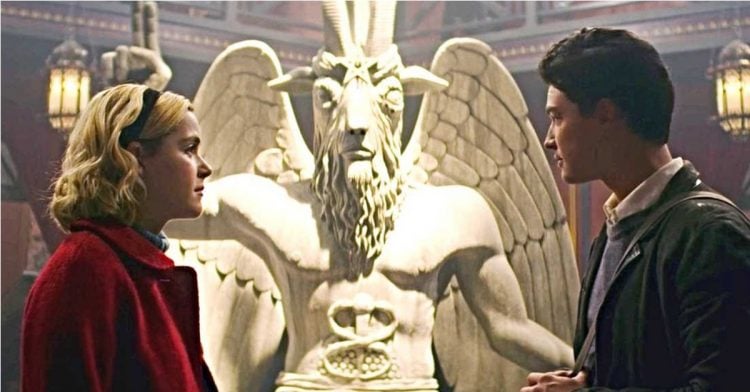
The Satanic Temple has made good on threats made by co-founder Lucien Greaves on Twitter about two weeks ago, and filed a $50 million lawsuit against Netflix for their use of a statue of the pagan deity Baphomet as a set piece on its new series ‘Chilling Adventures of Sabrina’. Greaves claims that the creators of ‘Sabrina’ stole its design of the statue from the Satanic Temple, which placed a copyright on their design, which depicts the goat-headed deity with two children by its side, looking up at him. On ‘Sabrina’, the statue is never referred to by name but is a focal point at the Academy of Unseen Arts, where young witches and warlocks go to hone their magical abilities.
The Satanic Temple is not only seeking financial compensation but wants Netflix and Warner Brothers to stop distributing ‘Chilling Adventures…’ or further distributing it, meaning releasing it on DVD or Blu-Ray.
In the filing with the New York federal court, the Temple asserts:
“Baphomet is a historical deity which has a complex history, having been associated with accusations of devil worship against the Knight Templar. Baphomet historically involved a goat’s head (sometimes known as the ‘Sabbatic Goat’) on a female body associated with Lilith, a figure from Jewish mysticism sometimes considered a goddess of the night. The classic visual representation of idea of Baphomet is an image created in or about 1856 by an occult historian Eliphas Levi…”

One website mentioned in the filing describes the Satanic Temple’s statue as the “most politically charged sculpture of our time.” The Temple also expressed that its statute was intended “to be a central part of its efforts to promote First Amendment values of separation of church and state and equal protection… [Netflix’s] prominent use of this symbol as the central focal point of the school associated with evil, cannibalism and murder blurs and tarnishes the TST Baphomet with Children as a mark of TST.”
As the filing further states:
“This case presents, among other things, a textbook example of the hornbook explanation of copyright protection that copyright law protects unique expressions, but not the ideas themselves. What makes this case particularly striking and significant is that it arises in the context of Defendants who are highly sophisticated media production and distribution companies which blatantly misappropriated Plaintiff’s unique expression of an idea even though they have a long history of vigorously protecting their own intellectual property.”
Stay tuned for any updates to this situation.
Source: The Hollywood Reporter
